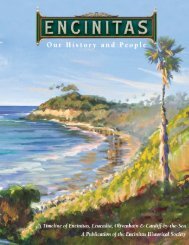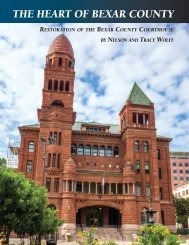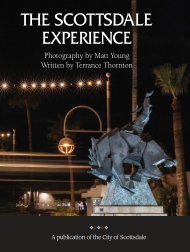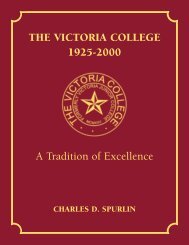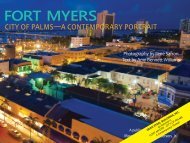Notable New Orleanians: A Tricentennial Tribute
An illustrated history of New Orleans paired with the histories of companies that have helped shape the city.
An illustrated history of New Orleans paired with the histories of companies that have helped shape the city.
Create successful ePaper yourself
Turn your PDF publications into a flip-book with our unique Google optimized e-Paper software.
D R . LOUIS C HARLES R OUDANEZ<br />
(1823-1890)<br />
Dr. Louis Charles Roudanez launched Reconstruction politics in <strong>New</strong> Orleans in 1862 with the<br />
publication of his first newspaper, L’Union. The paper announced that African-Americans must<br />
have the right to vote. Dr. Roudanez pursued this goal for the remainder of the War and<br />
Reconstruction, diminishing as a voice with the end of formal Reconstruction and the expiration<br />
of his second newspaper the <strong>New</strong> Orleans Tribune.<br />
Born in St. James Parish, Roudanez received a first-class education for the<br />
time. He attended Dartmouth College and later received a medical degree from<br />
the University of Paris. His professors urged him to remain in France, as they did<br />
for Norbert Rillieux (q.v.), another Creole. But Roudanez was inspired by his participation<br />
in the French revolution of 1848, which led to the end of slavery within<br />
the French empire. This inspiration led him to return to <strong>New</strong> Orleans where<br />
he began a successful practice as a physician on Customhouse Street (Iberville)<br />
at the edge of the French Quarter. His clientele there were probably both black<br />
and white.<br />
In September 1862, with Union troops in the city and General Benjamin<br />
Butler considering his options, Dr. Roudanez, assisted by his brother Jean<br />
Baptiste and Paul Trevigne, launched their L’Union, the first black-sponsored<br />
newspaper in the United States. Primarily aimed at the French Creole population,<br />
it also carried English content and for two years came out three times a week.<br />
From the beginning it brought up the right to vote, although aware that neither<br />
Butler nor President Abraham Lincoln was prepared to endorse black voting.<br />
In March of 1864 the Roudanez-inspired petition for voting rights signed by<br />
one thousand African-Americans in <strong>New</strong> Orleans was presented to Lincoln at the<br />
White House. That July, L’Union folded, to be succeeded two days later by another<br />
Roudanez newspaper, the <strong>New</strong> Orleans Tribune. This paper was far more radical,<br />
calling for the end of discrimination in public accommodations, street cars, and<br />
segregated public schools. The <strong>New</strong> Orleans Tribune eventually became a daily<br />
newspaper, widely read in Washington and <strong>New</strong> York, and wielding significant<br />
influence over the politics of Louisiana Reconstruction. In October 1865 Frederick Douglas wrote<br />
J. B. Roudanez praising the paper and stating that he read it whenever he could.<br />
In 1867, Roudanez achieved his dream when a state election to a new constitutional convention<br />
saw 75,000 voters, of which most were black. Although the constitution it produced contained<br />
most of Roudanez’ Tribune agenda, internal politics within the Republican party spelled the end of<br />
the paper within a year. The Republicans backed the Creole Francis Dumas for Governor against<br />
Henry Clay Warmouth, fearing Warmouth was too close to the Democrats. Warmouth’s narrow victory<br />
led to a Republican party boycott of the Tribune. Warmouth went on to veto legislation implementing<br />
the radical planks of the constitution, just as Roudanez had feared. The new governor also<br />
delisted the Tribune as an official government journal, and by 1869 it was virtually out of business.<br />
Roudanez carried on his efforts, best evidenced by his prominent role in the Unification<br />
Movement of 1873 led by General P. G. T. Beauregard. This large group supporting racial solidarity<br />
among blacks and whites had a life of only one year. Removed from politics, Roudanez continued<br />
to practice medicine almost until his death in 1890, just before Homer Plessy (q.v.) took his fateful<br />
train ride.<br />
<br />
Louis Charles Roudañez.<br />
COURTESY OF ROUDAÑEZ HISTORY AND LEGACY,<br />
WWW. ROUDAÑEZ.COM.<br />
For further reading see Mark Charles Roudané. The <strong>New</strong> Orleans Tribune: An Introduction to America’s First Black Daily<br />
<strong>New</strong>spaper. <strong>New</strong> Orleans: Mark Roudané, 2014. Gospel Banner (Augusta, Maine). September 1, 1866. on the Tribune. Keith<br />
Weldon Medley. http://www.theneworleanstribune.com/main/celebrating-dr-louis-charles-roudanez/, by McKenna Publishing,<br />
150th Anniversary of the original <strong>New</strong> Orleans Tribune.<br />
BIOGRAPHIES<br />
75










